out from the cabin doors. In their wake follows a raft of cut timber, green-heart probably, or brown-heart, or purple-heart, or balata, or letter-wood, or locust-wood, or whatever other forest growth finds its market in town; and standing on it, one or more statuesque figures, that look as if they had been cut out of dark porphyry by no unskilful hand, and well polished afterwards, guide its downward course. Most numerous of all, light corials, that have retained the Indian name as well as build, each one hollowed out of a single tree-trunk, with sometimes a couple of extra planks roughly tacked on to the sides by way-of bulwarks, paddle past us, under the guidance of one or two ragged negro labourers, or husbandmen, who exchange shouts, sometimes of jest, sometimes of quarrel, with their fellows in other boats or on the shore. These little skiffs, drawing scarce a foot of water when deepest laden, pass through the narrowest ditches that divide almost every acre of cultivated land on the estates from the other, and are the chief means of passage for the working folks on their way to and fro between country and town. When not in actual use they are kept sunk in water just deep enough to cover them, and thus preserved from the sun-heat, which would otherwise soon split the unseasoned wood. Lastly, a few clumsy boats of the ordinary longshore type, in the service of trade with the ships that lie anchored, giving out or taking in cargo off the town-wharf, mix up with the rest, and add their quota of variety to the river-crafts of Surinam.
However, on the present occasion it is neither barge, plain or gay, nor a boat, not even a corial, that is waiting to receive our party. A flat-bottomed river-steamer, one of the three that belong to the service of the colony, lies off the wharf; she draws about ten feet of water, and her duty is just now to convey us up the Commeweyne River, and its main tributary the Cottica, where lies the district which his Excellency has selected for our inspection, because affording the greatest variety of scenery and cultivation within easy reach of Paramaribo. I have said that the colony possesses three of these boats; the largest of them makes a voyage along the seacoast as far as Georgetown twice every month; the two smaller confine their excursions within the limits of river navigation.
In a few minutes we were all on board, a merry party, Dutch and English, official and non-official, military, naval, civilian and burgher, but all of us bent alike on pleasing and being pleased to the best of our opportunities. Our boat was well supplied, too, with whatever Dutch hospitality — no unsubstantial virtue — could furnish for convivial need, and was commanded by a paragon of boat-captains — a bright-eyed, brown-faced little man, Scotch by his father's side, Indian by his mother's; himself uniting in physiognomy as in character the shrewdness and practical good sense of the former parentage with the imperturbable calm and habitual good-humour of the latter. Under such auspices we started on our way.
To enter the Commeweyne River we were first obliged to retrace a portion of the route by which I had arrived three days before, and to follow the downward course of the Surinam River for about eight miles, passing the same objects, no longer wholly new, but now more interesting than before, because nearer and better understood. Here is a plantation, seen by glimpses through the mangrove scrub that borders the river's bank; a narrow creek, at the mouth of which several moored barges and half-submerged corials are gathered, gives admittance to the heart of the estate. It is a vast cocoa-grove, where you may wander at will under three hundred and fifty continuous acres of green canopy — that is, if you are ready to jump over any number of small brimming ditches, and to cross the wider irrigation trenches on bridges, the best of which is simply a round and slippery tree-trunk, excellently adapted, no doubt, to the naked foot of a negro labourer, but on which no European boot or shoe can hope to maintain an instant's hold. Huge pods, some yellow, some red, — the former colour is, I am told, indicative of better quality — dangle in your face, and dispel the illusion by which you might, at first sight of the growth and foliage around you, have fancied yourself to be in the midst of a remarkably fine alder-tree thicket; while from distance to distance broad-boughed trees of the kind called by the negroes "coffee-mamma," from the shelter they afford to the plantations of that bush, spread their thick shade high aloft, and protect the cocoa-bushes and their fruit from the direct action of the burning sun. Moisture, warmth, and shade — these are the primary and most essential conditions for the well-doing of a cocoa-estate. Innumerable trenches, dug with mathematical exactitude of alternate line and interspace, supply the first requisite; a temperature that, in a wind-fenced situation like this, bears a close resem-

